User Management for a Workspace is performed by an Administrator through the Workspace Members and Admin areas of that Workspace's browser interface, accessed from an external browser. This provides the interface to the Identity Service (IDS), with which to define applicable service access, through the specification of Users and Roles.
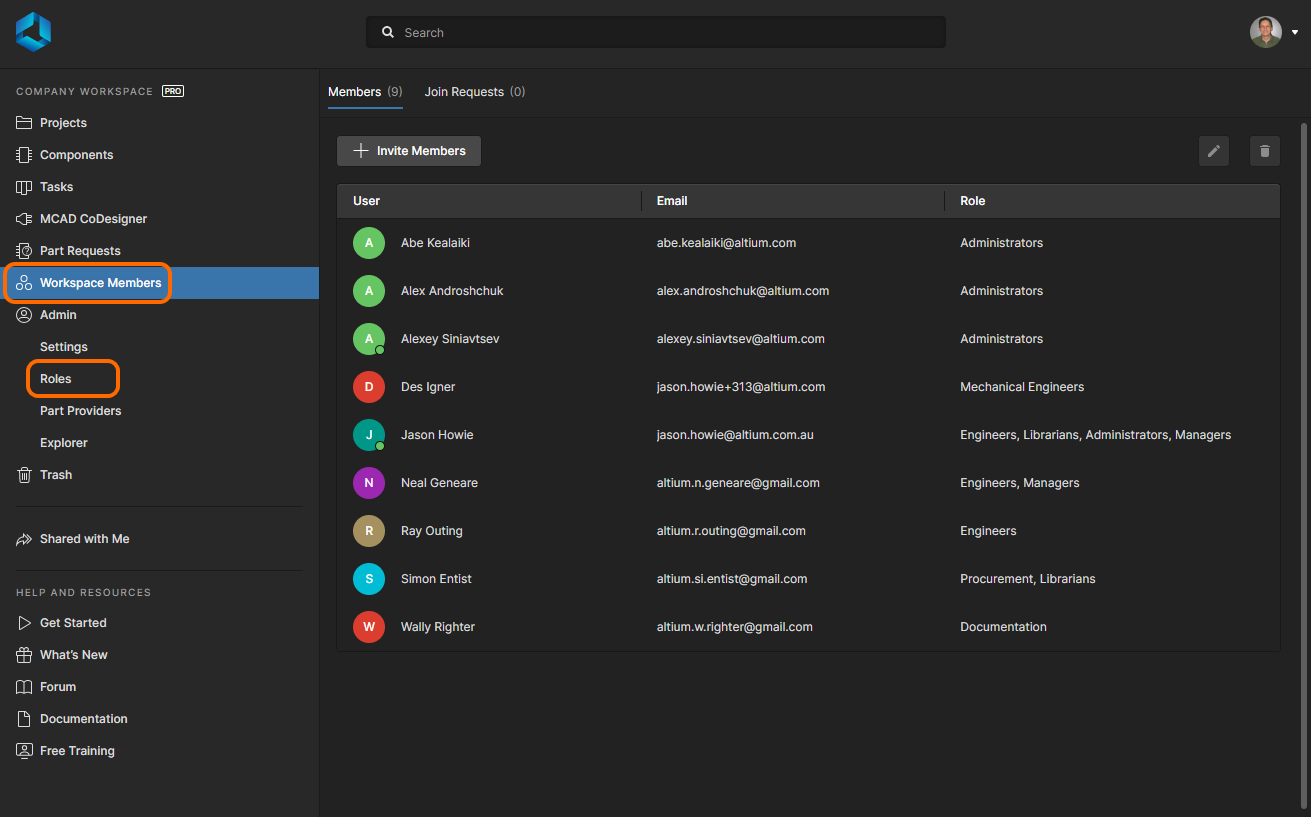 User management is performed by an Administrator through the Members and Admin areas of the Workspace's browser interface.
User management is performed by an Administrator through the Members and Admin areas of the Workspace's browser interface.
Controls are spread over the following pages:
- Workspace Members – use this page to create and manage a list of users; people who are to have access to the Workspace and/or its associated technologies. Users can be those with AltiumLive accounts within your own organization, or those in a different organization (in the case of the latter, inviting them in as members of a Workspace does not mean they become part of your organization). You can also invite users who do not have an AltiumLive account (who will need to then register for one).
- Admin – Roles – use this page to create and manage a list of roles; roles allow you to further organize your users according to, for example, the particular section of the organization in which they are involved, or the design team they are in. Roles also make the sharing of Workspace content, and the configuration of other served technologies, more streamlined.
Only an administrative user has full access to management controls. Standard users (non-administrators) can view the list of members from the Workspace Members page of the interface.
Workspace Members
Management of users for access to the Workspace and related services is performed from the Workspace Members page. A user member is simply a person who it is intended will need access to the Workspace.
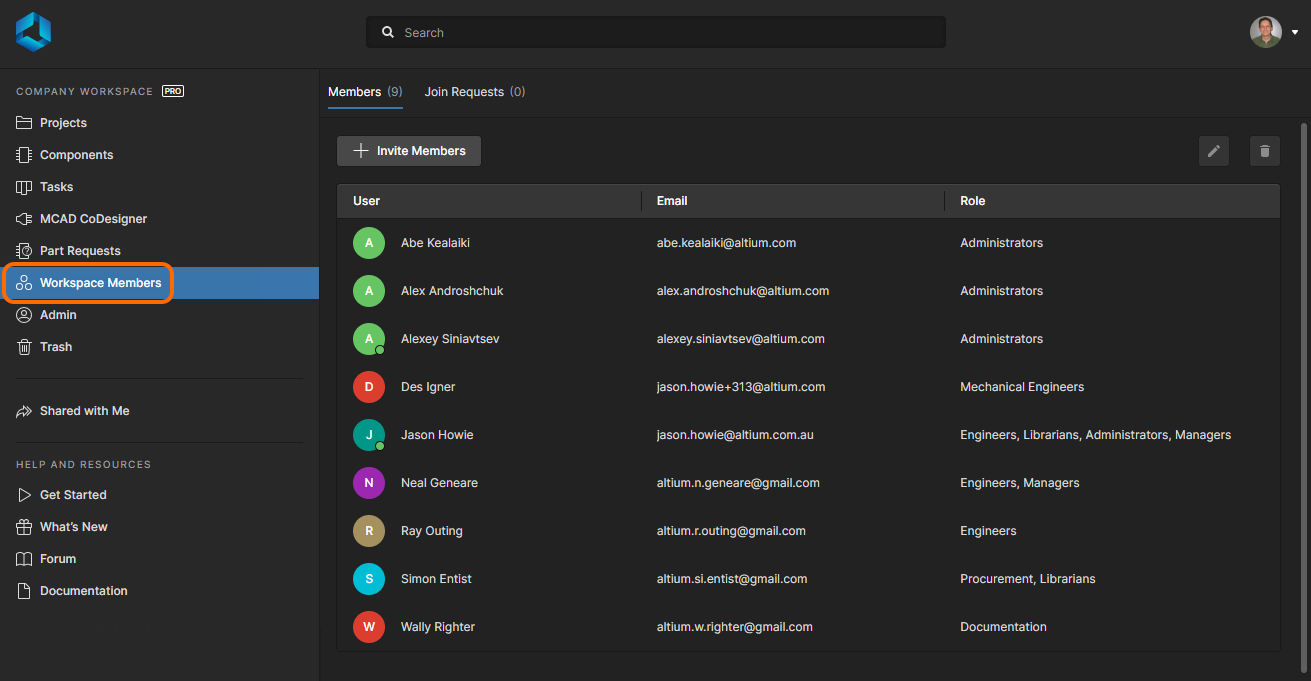 Determine which people are to have access to the Workspace, from the Members page of the browser interface.
Determine which people are to have access to the Workspace, from the Members page of the browser interface.
All defined users are presented in a flat listing.
Within the main listing, each user is displayed in terms of the following information:
- User – the name of the user (<First Name> <Last Name>) which is acquired from the user's AltiumLive profile.
An accompanying icon for the user will also be presented, including the first letter of their forename (e.g.

).
- Email – the user's email address, which they use to sign in to AltiumLive (and also sign in directly to the browser-based Altium 365 Platform Interface (https://365.altium.com)).
- Role – the role(s) of which the user is currently a member. At the basic software access level this is an Administrator column with a checkbox to reflect whether the user is an Workspace Administrator (checked) or not.
Note that a user who is currently accessing the Workspace is distinguished by a green dot (e.g.  ). You can search for a user by their name (User field) using the dedicated Search field at the top-left.
). You can search for a user by their name (User field) using the dedicated Search field at the top-left.
There is no limit to the number of users that may be registered to access and use a Workspace.
Adding a New User
Related page: Inviting Other Users to Your Workspace
A new user can be added for access to your Workspace – inviting them to be a member – in a number of ways. Use the link to the related page above for a more detailed look at the various ways supported. From the Workspace Members page of your Workspace's browser interface, user addition can be performed by clicking on the  button, located at the top-left of the page.
button, located at the top-left of the page.
The Invite Workspace Members window will appear with which to enter the email for the prospective user and to specify additional role membership for that user.
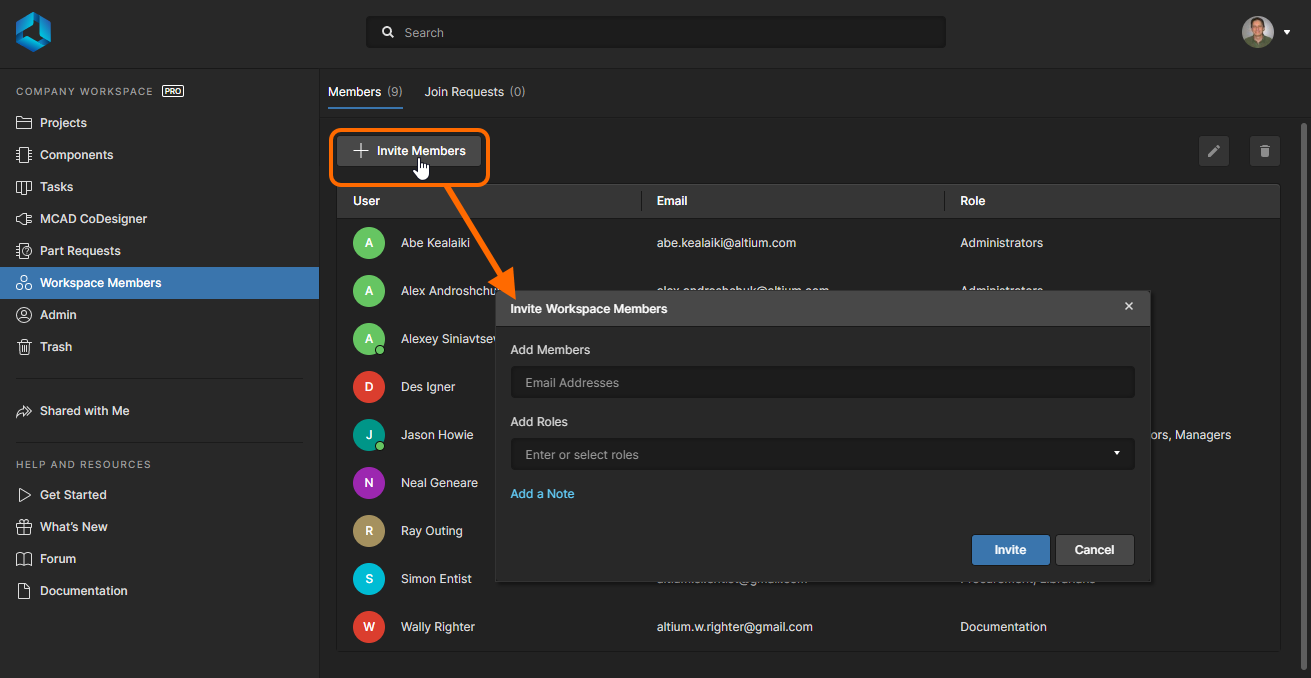 When you click to add a new user (invite people to be a member), you will be presented with a window in which to specify one or more users, and their role membership.
When you click to add a new user (invite people to be a member), you will be presented with a window in which to specify one or more users, and their role membership.
You are able to invite:
- Other AltiumLive users from within your own organization.
- AltiumLive users from different organizations.
- Non-AltiumLive users (who will need to then register for AltiumLive accounts).
Enter the user's email address into the Add Members field. As you start to type, if the email address belongs to another AltiumLive user within your own organization – and who is not already a member of the Workspace – they will be listed for you to choose. If inviting users outside of your organization, irrespective of their AltiumLive status, you will need to enter their full email address. Multiple emails can be entered for invitation to the Workspace. To remove a user email click the delete cross, to the right of its name.
It is the user's AltiumLive login credentials that enable them to access the Altium 365 Platform Interface, and the Workspace they have been added to. From a browser interface, access to the Workspace will be available as soon as they sign in to Altium 365. From within Altium Designer, the Workspace (and any others that they have been added to as a member) will be presented for use once they have signed in to their AltiumLive account.
You cannot add another user with the same AltiumLive email address as an existing user.
Role AssignmentExpandCollapse
You can also specify which of the existing roles for the Workspace the user is to be made a member of, if required. Click within the Add Roles field to pop up a list of all currently defined roles. Select the required role from this list. If the user is required to have administrative powers, select the Administrators role. Multiple roles can be chosen for assignment. Assigned roles will appear in an Existing Roles region, once the user has been invited (created). To remove a role prior to its final assignment, click the delete cross to the right of its name.
Role assignment may be specified at any stage from the
Admin – Roles page but if roles exist, it can be easier to do this at the time of user creation/invite. Bear in mind that if any roles are defined, they will be applied to all users being invited.
With the basic level of software access you only have the option to specify whether or not the user is to be an Administrator. Enable the Administrators option to make them an Administrator, or leave it disabled to invite them as a standard (non-administrative) user.
Click the  control to access an area to enter a note. This will be added to the email invite that the invitee(s) receive.
control to access an area to enter a note. This will be added to the email invite that the invitee(s) receive.
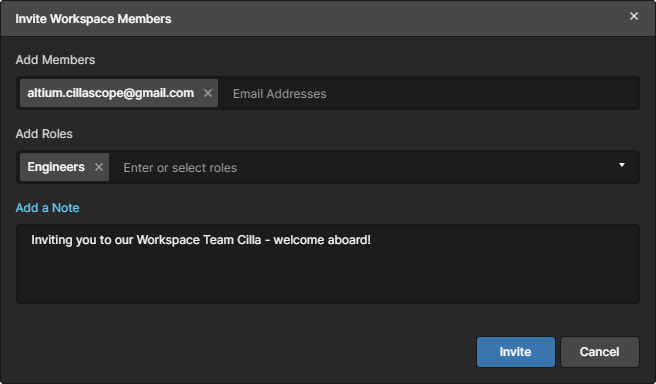 Example user set to be invited into the Workspace.
Example user set to be invited into the Workspace.
Once all details are filled out and specified as required, click the  button.
button.
For a user that already has an AltiumLive account (irrespective of whether they are in your own organization or not), they will be added as Workspace members straight away – appearing in the listing of users back on the main Workspace Members page. A non-AltiumLive user will need to register for an AltiumLive account before they are added as a member.
Each user will receive an email with which to gain access to the Workspace. They can access your Workspace by clicking the corresponding button in the email. What happens next depends on whether they already have an AltiumLive account or not:
- Invited user has an AltiumLive account – if the user is currently signed into their AltiumLive account within their browser, they will be taken to the Workspace (on Altium 365) directly. If they are not currently signed in to AltiumLive, they will be taken to the Altium 365 Sign In page first.
- Invited user does not have an AltiumLive account – the user will proceed to an intermediate registration form, with which to define their details, and specify a password. After signing up they will be added to, and taken to, the Workspace.
Editing an Existing User
You can edit an existing user by selecting that user and clicking the Edit (  ) button at the top-right of the listing. Alternatively select that user, click the
) button at the top-right of the listing. Alternatively select that user, click the  control to the far right, then choose the Edit command from the associated menu.
control to the far right, then choose the Edit command from the associated menu.
The Edit Workspace Member window will appear, from where you can make changes to that user's role membership(s) as required.
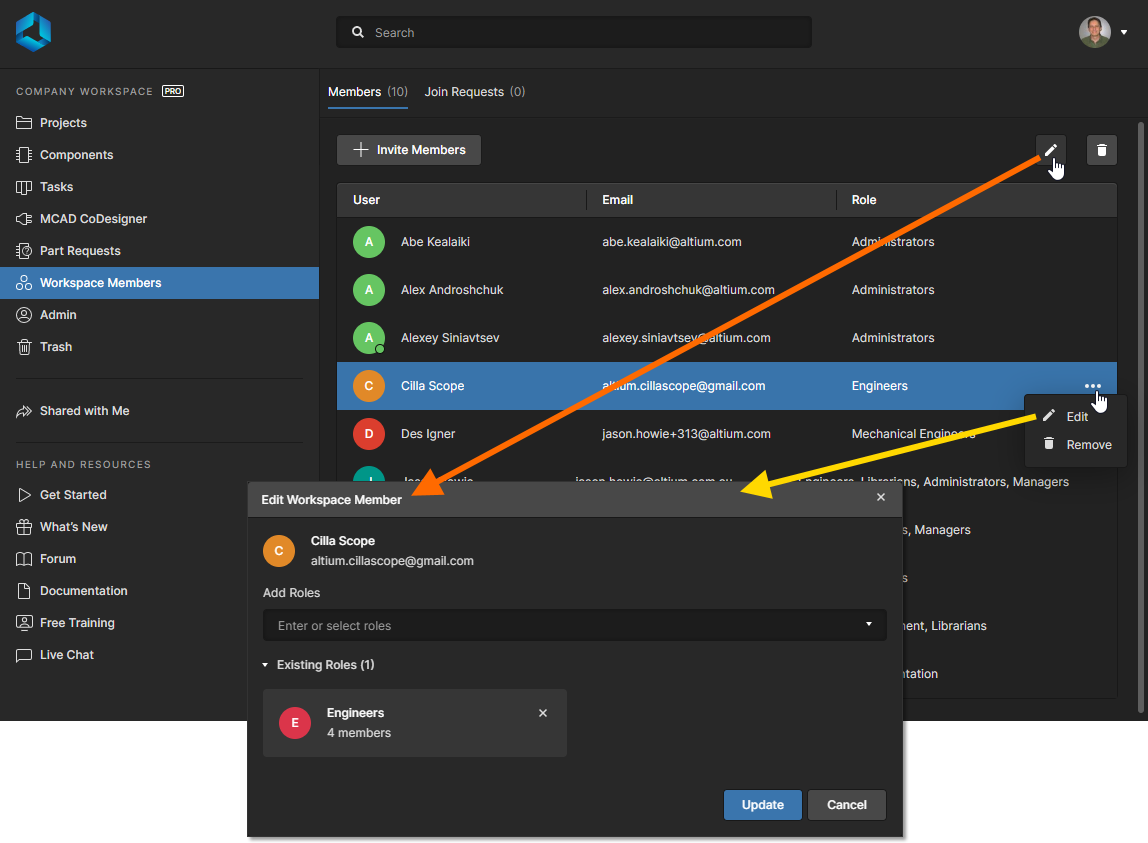 You can access and make changes to the role membership(s) for the selected user as required.
You can access and make changes to the role membership(s) for the selected user as required.
To remove the user from a particular role in which they are currently a member, click the

control for that existing role.
When all modifications have been made as required, click the  button to effect those changes.
button to effect those changes.
At the most basic level of software access you only can edit whether or not the user is a member of the Administrators role, using the associated checkbox in the Administrators column. A Window will appear asking you to confirm your decision to add/remove the user from the role (this can be set to not appear thereafter) – click  .
.
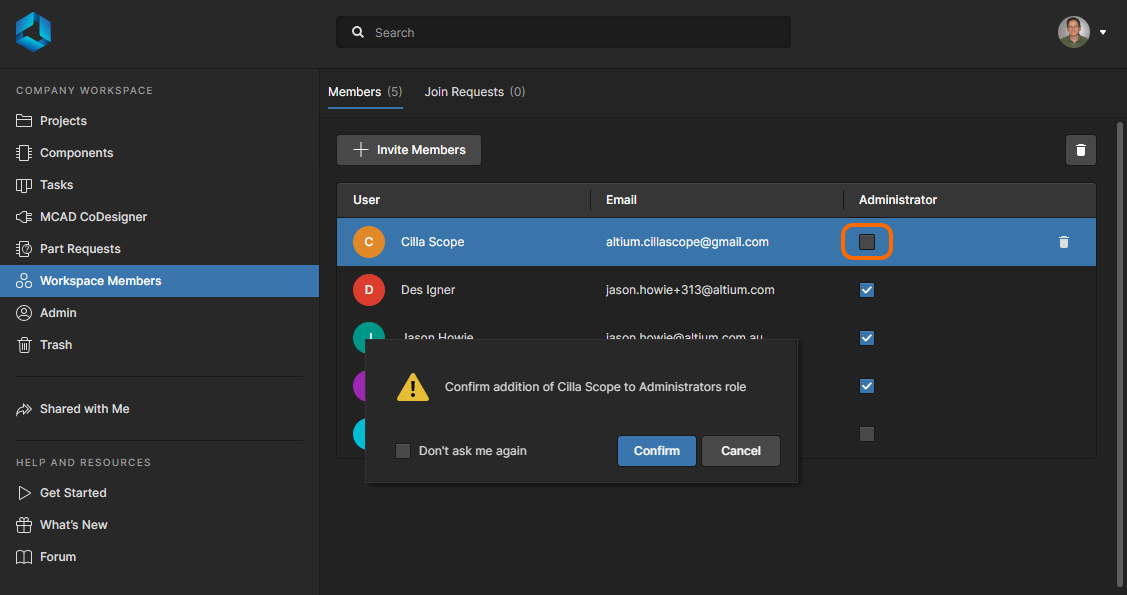 With basic software access you can add or remove a user from the Administrators role as required.
With basic software access you can add or remove a user from the Administrators role as required.
Removing a User
To remove an existing user from the Workspace select that user and click the Remove (  ) button at the top-right of the listing. Alternatively, select that user, click the
) button at the top-right of the listing. Alternatively, select that user, click the  control to the far right, then choose the Remove command from the associated menu.
control to the far right, then choose the Remove command from the associated menu.
A dialog will appear asking for confirmation to proceed with the deletion. Click  to proceed, after which the user will be removed from the Workspace's user database. They will no longer have access to the Workspace.
to proceed, after which the user will be removed from the Workspace's user database. They will no longer have access to the Workspace.
A user cannot remove themselves. In addition, a user who is actively connected to the Workspace cannot be removed.
If the Workspace member to be removed is the Owner of any Workspace Items (Projects, Managed Content, Components, etc), a dialog will open to request the nomination of a new Owner for the noted number of Items. Use the dropdown menu list to select a Workspace member that will adopt ownership of the Items, confirm the selection with the  button and then the
button and then the  option in the following dialog.
option in the following dialog.
A notification email (if enabled) will inform the new Owner of the changes (see example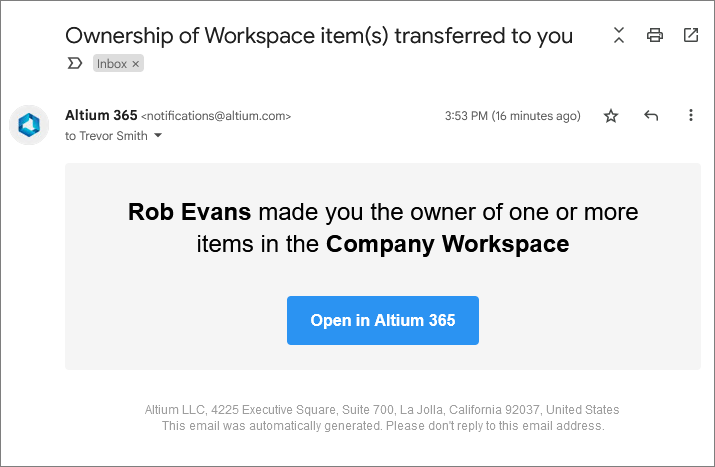 ).
).
 If required, specify a user that will become the new owner of the Items currently owned by the user to be removed.
If required, specify a user that will become the new owner of the Items currently owned by the user to be removed.
► See Transferring Project Ownership for related information on manually specifying a new project Owner.
The remove operation cannot be undone. If you remove a user by mistake, you will need to add that user back – by inviting them into the Workspace – in the same way that you would invite any new user.
Processing a Join Request
Users that are registered with your organization's account – as defined in the Dashboard's Users and Groups page – and do not have access to your company Workspace can request access via the Workspace Benefits option in their Personal Space.
► See Joining Your Organization Workspace for information on creating a Join Request.
Such a request will generate an access request email to the Workspace owner administrator and also create a Join Request entry in the Workspace Members page. The latter is accessible to administrators via the Join Requests tab option at the top of the page, which includes the current number of pending requests. Note also that the Workspace Members navigation entry has an associated red dot to indicate the presence of pending Join Requests.
Open the Join Requests view to approve (  ) or decline (
) or decline (  ) a request entry, or use the
) a request entry, or use the  and
and  options to approve/decline all listed request entries. In the dialog window that follows, assign a Role (or Roles) to an accepted user.
options to approve/decline all listed request entries. In the dialog window that follows, assign a Role (or Roles) to an accepted user.
When the process is complete, confirmation emails will be sent to both the administrator (
example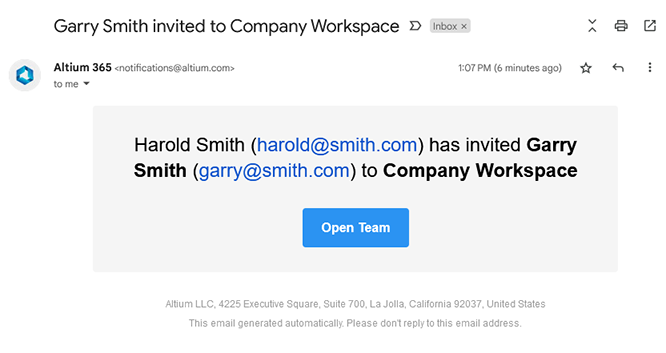
) and the user that created the request (
example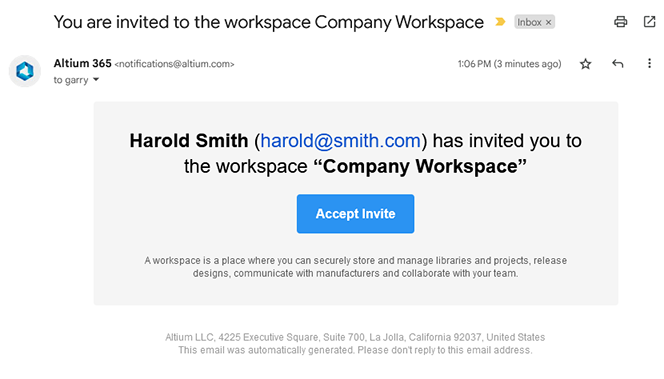
).
Processing an Invitation Request
All Workspace members that are not in the Administrators Role group administrators can submit a Workspace access request for another user from the  button on the Workspace Members page. Note that Administrators can directly grant access for such users.
button on the Workspace Members page. Note that Administrators can directly grant access for such users.
► See Submitting an Invitation Request (Non-admin Members) and Sharing with Users outside the Workspace for information on requesting access for another user.
In a similar way to Join Requests outlined above, this will generate an access request email to Workspace administrators and also create an Invitation Request entry in the Workspace Members page. The latter is accessible to administrators via the Invitation Requests tab option at the top of the page, which includes the current number of pending requests.
To grant Workspace access for the requested user, or to reject the submission, open the Join Requests view where you can approve (  ) or decline (
) or decline (  ) a request entry, or use the
) a request entry, or use the  and
and  options to approve/decline all listed request entries. In the dialog window that follows, assign a Role (or Roles) to an accepted user.
options to approve/decline all listed request entries. In the dialog window that follows, assign a Role (or Roles) to an accepted user.
When the process is complete, a confirmation email will be sent to the user that created the request (
example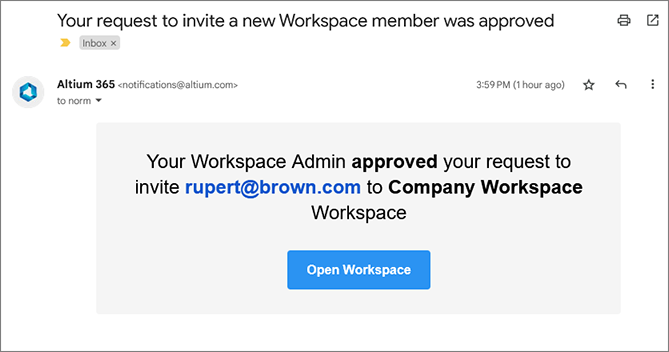
) and a Workspace invitation email sent to the newly added user (
example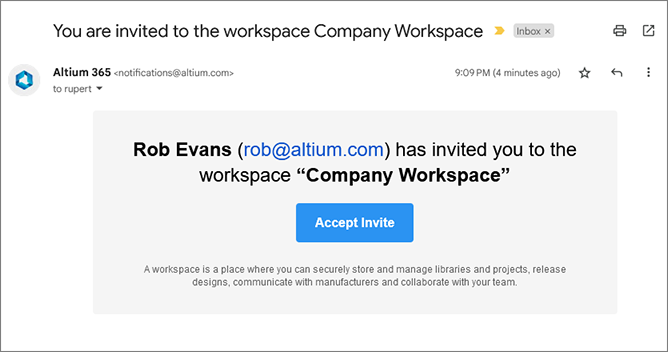
).
Viewing Guest Users
Users who are not members of the Workspace that have been granted shared access to a Workspace project are regarded as external user 'guests'. They have access to those shared project resources via the Shared With Me page in their Altium 365 Personal Space or in an Altium 365 Workspace they are a member of.
The Guests tab option on the Workspace Members page provides a quick way for Workspace Administrators to view a list of all external users that have been provided shared access to the Workspace as guests. Each entry has an associated  label, which is also used to distinguish Guest users in the project Share window.
label, which is also used to distinguish Guest users in the project Share window.

A Guest user's entry will remain in the list while a Workspace project is shared with them. To remove a Guest entry, locate any Workspace projects shared with that user and remove their shared access (see example ).
).
Admin – Roles
This page is used to manage roles for the Workspace. Roles allow you to further organize your existing Workspace members according to, for example, the particular section of the organization in which they are involved, or the design team they are in. Or perhaps they are people outside of your own organization – contractors, design bureau personnel, and the like. Roles also make the sharing of Workspace content and the configuration of other served technologies, more streamlined.
Several sample roles are defined at the time your Workspace is activated. This includes the role Administrators. This role gives administrative privileges to its members. Anyone who is a member of this role has complete access to the Workspace and all associated technologies and services through the browser interface.
The same user can be a member of any number of defined roles.
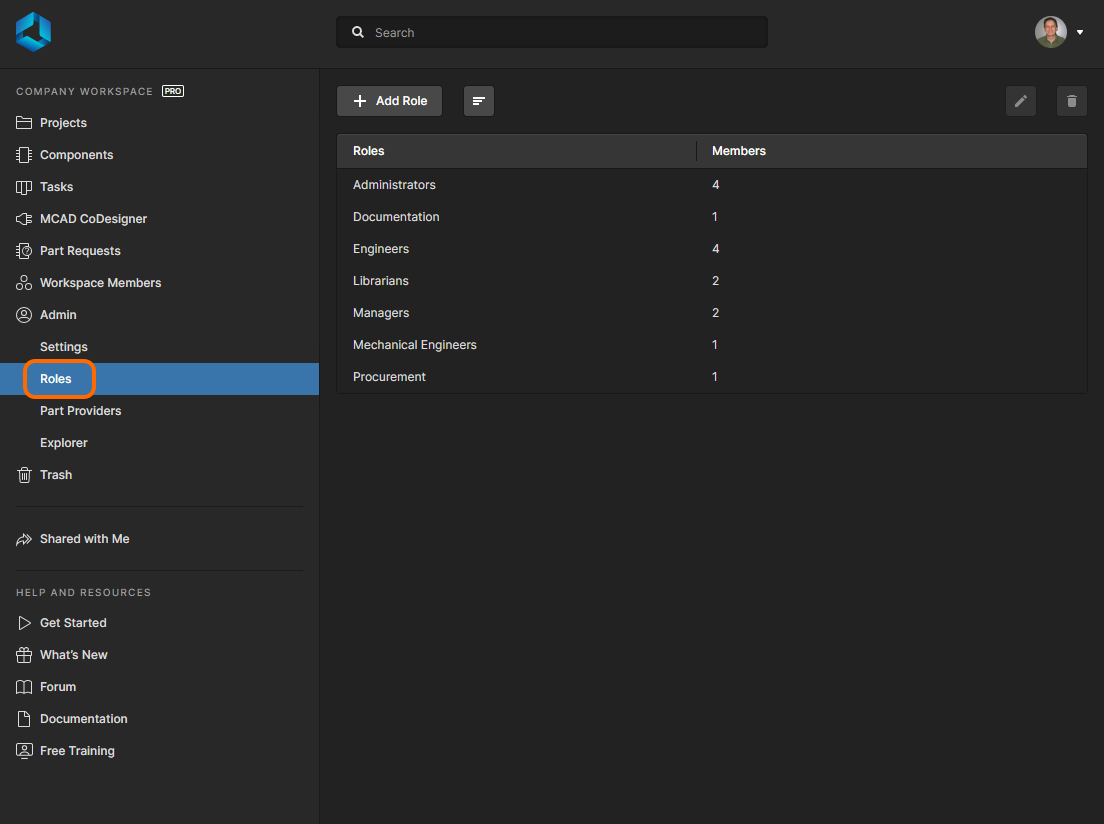 Create specific roles (or 'memberships') of users, from the Admin – Roles page of the browser interface.
Create specific roles (or 'memberships') of users, from the Admin – Roles page of the browser interface.
All defined roles are presented in a flat listing.
Within the main listing, each role is displayed in terms of the following information:
- Roles – the name of the role.
- Members – how many unique Workspace members are part of this role.
The Edit (  ) and Remove (
) and Remove (  ) buttons at the top-right of the listing (and also available from the menu associated with the
) buttons at the top-right of the listing (and also available from the menu associated with the  control for a role) enable you to edit the selected role, or to remove it, respectively. The Administrators role cannot be removed.
control for a role) enable you to edit the selected role, or to remove it, respectively. The Administrators role cannot be removed.
Click the

button and choose to
Sort by Role, or
Sort by Members. In addition, you can search for a role by name (
Roles field) using the dedicated
Search field at the top-left.
Adding a New Role
To add a new role, click on the  button, located at the top-left of the page. The Create Role window will appear with which to define the role, in terms of its name and members.
button, located at the top-left of the page. The Create Role window will appear with which to define the role, in terms of its name and members.
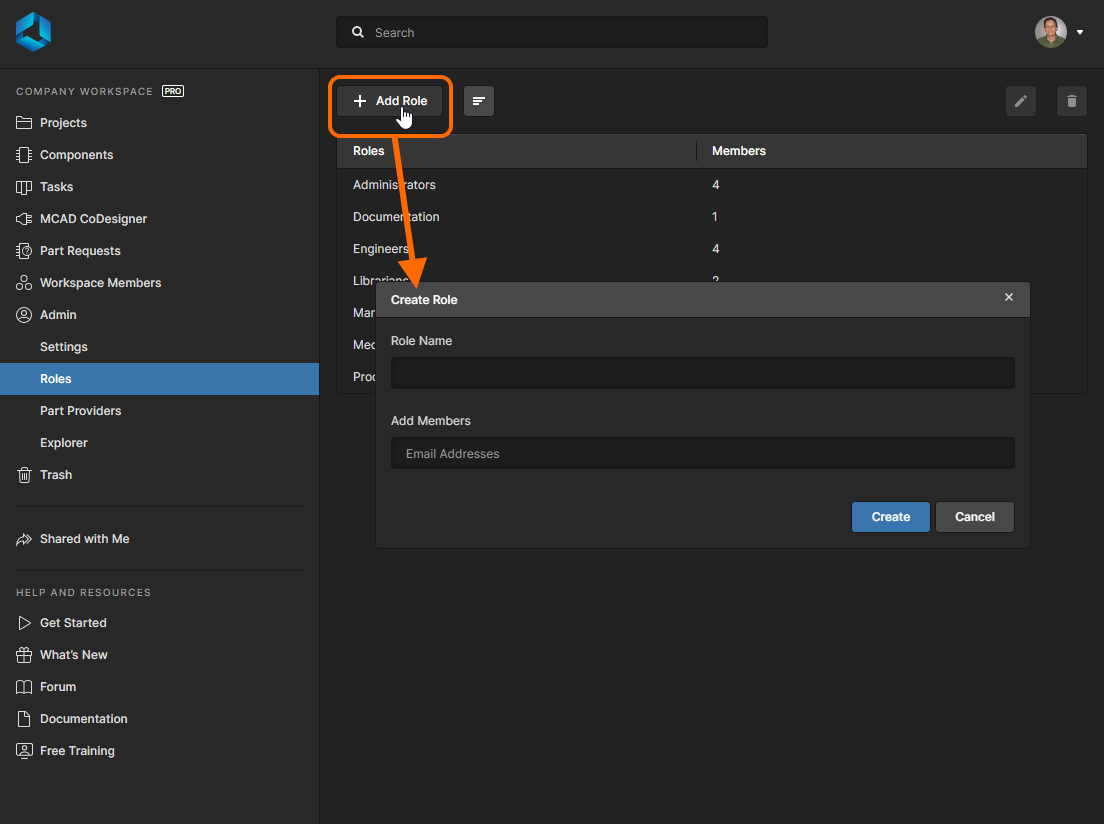 When you click to add a new role, you will be presented with a window in which to specify that role and its members.
When you click to add a new role, you will be presented with a window in which to specify that role and its members.
Use the Role Name field to enter a meaningful name for the new role. For example this may be a name that is reflective of the task performed by its members. This is a required field.
You will be prevented from trying to create two roles with the same name.
You can also specify constituent users for the role (its members). These can only be existing members of your Workspace. Start typing the first name, last name, or username (email address) of a user in the Add Members field, to pop up a list of matching Workspace members. Select the required user from the list. Multiple users can be chosen as members of the role.
Assigned users will appear in an Existing Members region, once the role has been created. To remove a user prior to this, click the delete cross to the right of their name.
Role membership may be specified at any stage but if users exist, it can be easier to do this at the time of role creation.
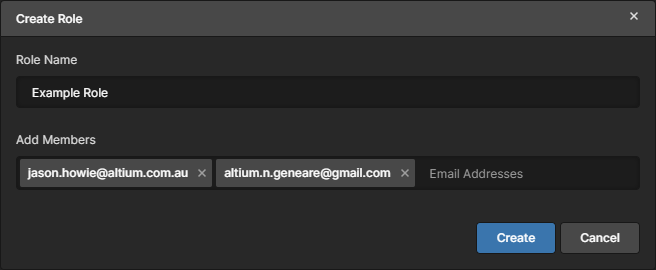 Example role with nominated members, ready to be created.
Example role with nominated members, ready to be created.
With name and members defined as required, click  to effect the creation of the role. The role will now be available in the list of roles for use in applicable areas elsewhere in the Workspace's browser interface – for example when inviting/editing a user, or sharing permissions for access to shareable data items within the Workspace.
to effect the creation of the role. The role will now be available in the list of roles for use in applicable areas elsewhere in the Workspace's browser interface – for example when inviting/editing a user, or sharing permissions for access to shareable data items within the Workspace.
Editing an Existing Role
You can edit an existing role by:
- Selecting that role and clicking the Edit (
 ) button at the top-right of the listing.
) button at the top-right of the listing.
- Selecting that role, clicking the
 control to the far right, then choosing the Edit command from the associated menu.
control to the far right, then choosing the Edit command from the associated menu.
The Edit Role window will appear, from where you can make any changes to the role's name and/or user membership as required.
The Administrators role cannot have its name changed. You can, however, manage members for this role, as with any other user-created role.
 Access and make changes to a role as required.
Access and make changes to a role as required.
To remove an existing user from the role, select their entry then click the

control at the far right.
When all modifications have been made as required, click the  button to effect those changes.
button to effect those changes.
Removing a Role
You can remove an existing role from the Workspace by:
- Selecting that role and clicking the Remove (
 ) button at the top-right of the listing.
) button at the top-right of the listing.
- Selecting that role, clicking the
 control to the far right, then choosing the Remove command from the associated menu.
control to the far right, then choosing the Remove command from the associated menu.
A dialog will appear asking for confirmation to proceed with the deletion. Click  to proceed, after which the role will be removed from the Workspace.
to proceed, after which the role will be removed from the Workspace.
The Administrators role cannot be removed.
The remove operation cannot be undone. If you remove a role by mistake, you will need to add that role back, in the same way that you would create any new role.